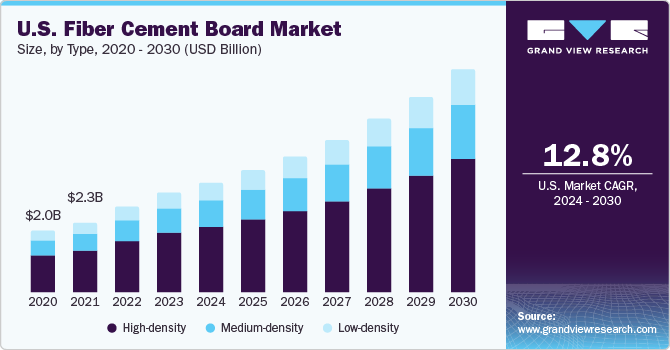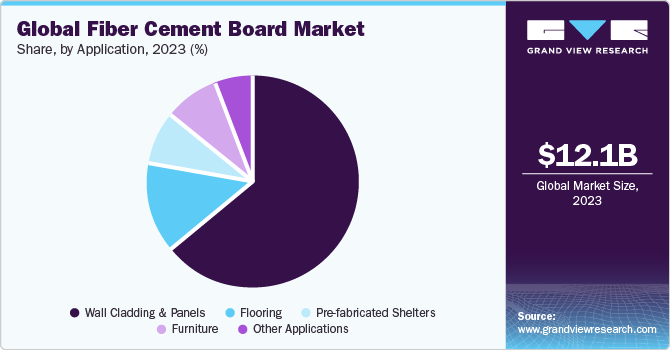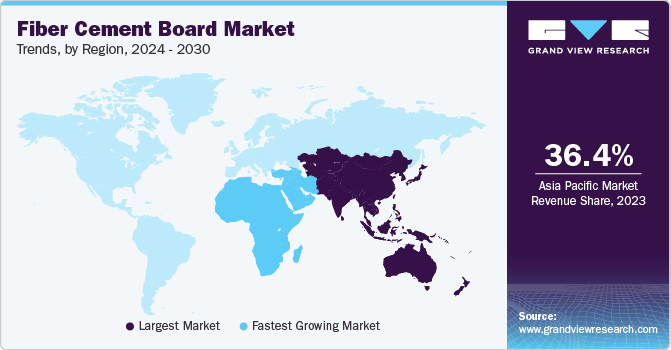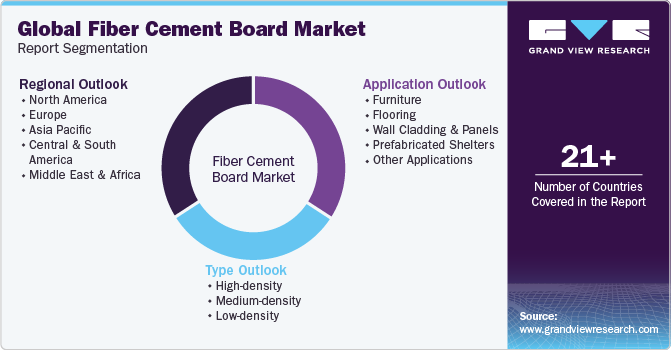
Fiber Cement Board Market Size, Share & Trends Analysis Report By Type (High-density, Medium-density, Low-density), By Application (Furniture, Flooring, Wall Cladding & Panels), By Region, And Segment Forecasts, 2023 - 2030
- Report ID: GVR-4-68040-091-9
- Number of Pages: 90
- Format: Electronic (PDF)
- Historical Range: 2018 - 2021
- Industry:Advanced Materials
Report Overview
The globalfiber cement board market sizewas estimated atUSD 10.04 billion in 2022and is expected to grow at a compound annual growth rate (CAGR) of 13.3% from 2023 to 2030. Population expansion in emerging countries, infrastructure upgrades in developed countries, and a tendency toward increased residential and commercial construction are all factors influencing growth. With the growing construction industry, the demand for the paints and coatings segment is also growing.Synthetic fibersare gaining traction and are expected to continue growing due to the increasing use of fiber cement in the production of boards.

Several factors, such as durability, cost-effectiveness, and fire retardancy are driving the product demand in furniture applications. Fiber cement boards have unique features and advantages that make them appealing for furniture use cases. Fiber cement boards can be sculpted and molded into various shapes, and therefore are ideal for furniture production. They are suitable for use as tabletops, shelves, cabinets, and other furniture components.
In the U.S., fiber cement boards are commonly utilized in various building applications such as siding, roofing, flooring, and interior wall cladding. The market for fiber cement boards in the country is likely to grow gradually owing to the rising emphasis on sustainable and energy-efficient construction practices, which is expected to drive the demand for fiber cement boards in the U.S. construction industry. Fiber cement boards are considered eco-friendly materials, resulting in their high demand on account of their advantageous properties such as durability, fire resistance, and low maintenance.
The value chain of the fiber cement board market comprises raw material suppliers, fiber cement board manufacturers/producers, distributors/suppliers, and industrial end users. The raw materials used in the manufacturing of fiber cement boards includecement, acrylic fiber, and other additives, which are derived from crude oil. The global fiber cement board industry comprises numerous raw material suppliers involved in large-scale production of the aforementioned materials.
Most fiber cement board companies have forward and backward integrated into the value chain, enabling them to optimize their operations to manage their operational expenses and establish their market dominance. Votorantim Cimentos, Ciment Quebec Inc., Indorama Corporation, and China National Petroleum Corporation (CNPC) have integrated their operations across the following stages of the value chain, i.e., beginning from raw material supply, product manufacturing, to product distribution/supply to end users.
的马努facturers in the market cater to the needs of the end-users in various ways. A majority of the players in the market distribute their products through distributors, sales offices, and sales representatives spread across different regions. Company-authorized distributors and specialized stores engaged in the sales and distribution of building supplies are major offline channels for fiber cement boards.
Type Insights
The high-density fiber cement board segment dominated the market and accounted for over 60% of the revenue share in 2022 and the segment is expected to continue its dominance over the forecast period. It is a cement-based composite made with cellulose fibers and other components. HDFCB HDFCB (high-density fiber cement board) has various advantages over traditional building materials like wood orgypsum boards; some of them are its superior strength, durability, and resilience to fire, water, and termite damage.
Medium density accounted for USD 2,502.1 Million for the year 2022 owing to its fire resistance, strength, and moisture resistance properties. Medium-density fiber cement board (MDFC) is a type of construction substrate that combines the strength of cement with the flexibility of wood fibers. It is often used in both interior and exterior applications. It is also resistant to warping, rotting, and termite attack, which provides it with a longer lifespan than traditional wood items.
Low density fiber cement (LDFC) board is a form of fiber cement board characterized by its light weight. It is a flexible building material that blends cement,cellulose fibers和添加剂,produce a long-lasting and lightweight product. In terms of handling, installation, and performance, LDFC boards have various advantages. They are resistant to impact, weathering, decay, and insect infestation. As a consequence, they are suitable for both internal and external applications, such as flooring, roofing, wall cladding, and decorative displays.
The growing demand for lightweight construction materials is a major driver for LDFC boards. As compared to typical building materials, their low density and light weight make them easier to transport, handle, and install. LDFC boards appeal to builders and architects due to their moisture resistance and longevity.
Application Insights
The wall cladding and panels segment emerged as the largest application segment with over 64.3% of the market revenue in 2022 owing to its protection against UV radiation and temperature variations. The use of fiber cement boards in wall cladding and panels has been growing owing to increasing urbanization, infrastructural development, and remodeling projects. The application segment can be segmented into furniture, flooring, wall cladding and panels, pre-fabricated shelters, and other applications.
The pre-fabricated shelters is the fastest growing segment with a CAGR of 14.4% in terms of revenue for the year 2022. Fiber cement board panels can be easily made and assembled in a factory setting, enabling faster completion than traditional on-site construction. Due to their ease of construction, pre-fabricated shelters are appealing for a variety of purposes, including crisis aid, temporary housing, and detached construction plants.

Due to their durability, fire resistance, and sustainability, fiber cement boards are growing in acceptance in furniture design and manufacturing. The fiber cement board in furniture applications is still in its early stages, with only a few producers specializing in this material. This provides a chance for futuristic furniture designers and producers to establish themselves in this specialized market.
Fiber cement board is a persistent and adaptable material with many advantages for flooring applications. Additionally, it is gaining popularity due to its resilience and resistance to moisture, pests, and fire as consumers seek long-lasting and low-maintenance flooring solutions. The rise of fiber cement boards in flooring applications is being driven by market demand for such flooring solutions.
Regional Insights
Asia Pacific emerged as the leading regional market and accounted for nearly 36.3% of the overall revenue share in 2022. The governments in the region are taking efforts to develop infrastructure such as building hospitals, education hubs, commercial centers, and residential complexes. These factors, coupled with the increasing population, are expected to drive the demand for the product in the region.
The North America fiber cement board industry is predicted to grow significantly over the coming years owing to rising demand for environmentally friendly and energy-efficient building materials. Increasing urbanization, renovation and remodeling operations and an emphasis on green building approaches have all contributed to the growth of the market.
Middle East & Africa is expected to be the fastest-growing region with a CAGR of 14.1% in 2022. The construction sector in the Middle East & Africa (MEA) is rapidly growing and is likely to expand in the future, which, in turn, is expected to drive the consumption of fiber cement boards. Along with the construction industry, the region is also expected to grow in terms of furniture which will drive the consumption of fiber cement board in bedding & furniture applications.

The Central & South America market is expected to grow substantially over the forecast period. Changing consumer preferences, low production costs, rapid industrialization, and increasing disposable incomes are anticipated to drive the economic growth of the region over the next few years. These factors are projected to fuel the demand for fiber cement boards in the region over the forecast period.
Key Companies & Market Share Insights
Numerous global as well as regional market players are operating in the market. Factors such as penetration of the product in major application areas such as furniture, wall cladding & panels, and flooring coupled with product consumption, the presence of well-established manufacturers, and the intensity of rivalry govern the competitive nature of the market. The market is highly fragmented in nature with the presence of several major players such as HIL Limited, CenturyPly, Everest Industries Limited, Sahyadri Industries Pvt. Ltd., and SAINT-GOBAIN as well as a number of small- and medium-sized global and regional players. Mergers, acquisitions, and collaborations are a few strategies adopted by market players to expand their product portfolio along with global presence.
For instance, in June 2022, Swisspearl Group announced the acquisition of Denmark's Cembrit, situated in Aalborg, Denmark. The move was taken by the company to expand its international market presence and production sites. The acquisition of 1,400 Cembrit employees is going to result in a 2,600-employee company. Some of the prominent players in the global fiber cement board market include:
Beijing Hocreboard Building Materials Co. Ltd.
HIL Limited
CenturyPly
Everest Industries Limited
SAINT-GOBAIN
Sahyadri Industries Pvt. Ltd.
东丽建材有限公司。
Visaka Industries
James Hardie Building Products Inc.
Allura
Fiber Cement Board Market Report Scope
Report Attribute |
Details |
Market size value in 2023 |
USD 12.08 billion |
Revenue forecast in 2030 |
USD 27.18 billion |
Growth rate |
CAGR of 13.3% from 2023 to 2030 |
Base year for estimation |
2022 |
Historical data |
2018 - 2021 |
Forecast period |
2023 - 2030 |
Quantitative units |
Volume in million square meters, revenue in USD billion, and CAGR from 2023 to 2030 |
Report coverage |
Revenue forecast, company ranking, competitive landscape, growth factors, and trends |
Regional scope |
North America; Europe; Asia Pacific; Central & South America; Middle East & Africa |
Country scope |
U.S.; Canada; Mexico; UK; Germany; France; Italy; Spain; China; India; Japan; Australia; Brazil; Saudi Arabia; UAE |
Segments covered |
Type, application, region |
Key companies profiled |
Beijing Hocreboard Building Materials Co. Ltd.; HIL Limited; CenturyPly; Everest Industries Limited; SAINT-GOBAIN; Sahyadri Industries Pvt. Ltd.; Toray Building Materials Co., Ltd.; Visaka Industries; James Hardie Building Products Inc.; Allura |
Customization scope |
Free report customization (equivalent to up to 8 analysts' working days) with purchase. Addition or alteration to country, regional & segment scope. |
革命制度党cing and purchase options |
Avail customized purchase options to meet your exact research needs.Explore purchase options |
Global Fiber Cement Board Market Report Segmentation
This report forecasts revenue growth at global, regional, and country levels and provides an analysis of the latest industry trends in each of the sub-segments from 2018 to 2030. For the purpose of this study, Grand View Research has segmented the global fiber cement board market report on the basis of type, application, and region:

Type Outlook (Volume, Million Square Meters; Revenue, USD Billion, 2018 - 2030)
High-density
Medium-density
Low-density
Application Outlook (Volume, Million Square Meters; Revenue, USD Billion, 2018 - 2030)
Furniture
Flooring
Wall Cladding & Panels
Pre-fabricated Shelters
Other Applications
Regional Outlook (Volume, Million Square Meters; Revenue, USD Billion, 2018 - 2030)
North America
U.S.
Canada
Mexico
Europe
UK
Germany
France
Italy
Spain
Asia Pacific
China
Japan
India
Australia
Central & South America
Brazil
Middle East & Africa
Saudi Arabia
UAE
Frequently Asked Questions About This Report
b.The fiber cement board market size was estimated at USD 10.04 billion in 2022 and is expected to reach USD 12.08 billion in 2023.
b.The fiber cement board market is expected to grow at a compound annual growth rate of 13.3% from 2023 to 2030 to reach USD 27.18 billion by 2030.
b.High-density fiber board dominated the fiber cement board market with a revenue share of 60.9% in 2022 owing to its superior strength, durability, and resilience to fire, water, and termite damage properties.
b.Some of the key players operating in the fiber cement board market include Beijing Hocreboard Building Materials Co. Ltd., HIL Limited, CenturyPly, Everest Industries Limited, SAINT-GOBAIN.
b.The key factor which is driving the fiber cement board market is the rise in building and construction activities due to rapid urbanization and industrialization across the globe.





